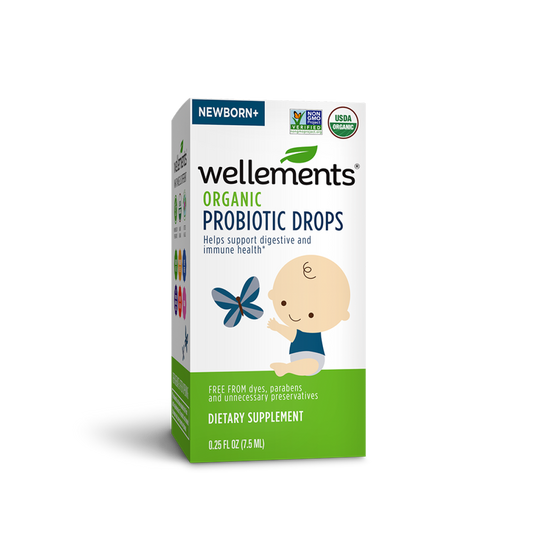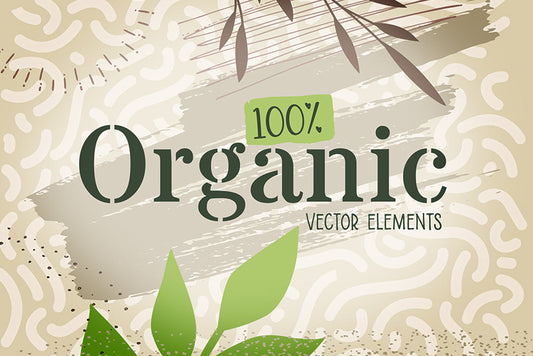4 Reasons Probiotics Are Great for a Mom & Her Baby
| updated:Share

Probiotics almost seem like a buzzword nowadays, with many parents and medical professionals discussing them. The benefits of probiotics mostly center around digestive health, which benefits new moms and their babies.
If taking a pill or mixing a drop or two of a supplement into formula could help relieve nausea and other digestive problems, shouldn't you or your child take it? The answer depends on your understanding of probiotics and existing health.
What Are Probiotics
Probiotics are living organisms, specifically bacteria. Before you squirm or get grossed out, understand that your digestive system is full of "good" and "bad" bacteria. When you are healthy, your digestive system has a balance between these differing bacteria.
Probiotics are "good" bacteria. Depending on the strain in the supplements like Wellements Organic Probiotic Drops, the organisms can help fight disease-causing cells, digest food, and produce essential vitamins.

Are They Safe to Take for New Moms
Probiotics for babies and nursing mothers are likely safe. According to the National Center for Complementary and Integrative Health, probiotics have an extensive history of safe use. Some people do not realize that foods like yogurt and other fermented products contain "good" bacteria; it is part of what makes them so beneficial. Also, the National Institute of Health and the National Library of Medicine concur with the NCCIH's assessment.

4 Reasons New Moms Should Take Probiotics for Her & Her Baby
The evidence to support using supplements for probiotic and microbiome balance is insufficient. Still, anecdotal evidence suggests probiotics for new moms and babies can have many benefits. For example, women often get more urinary tract infections than men; probiotics can reduce such infections because they help lower acidic pH, making the vagina inhospitable to UTI-causing "bad" bacteria. Beyond reducing the likelihood of some infections, the "good" bacteria can benefit moms and babies in at least four other ways.
3.8 /
5.0
(121)
121
total reviews
Probiotic Drops
Sale price
$29.99
1. Reduces Nausea
Nausea is common during pregnancy, and it is also routine for little ones. An upset stomach is usually the result of inflammation or irritation in the stomach or gastrointestinal tract. In some instances, stomach issues stem from an imbalance in the system. When you take probiotic supplements or give them to your child, you can help restore order to the gut microbiome, reducing the frequency and duration of bellyaches.
2. Mood Support
Mental health is vital to new moms; probiotics for breastfeeding moms can help support healthy brain activity, including mood support. When the gut microbiome is unbalanced, it can cause inflammation, sending stress signals to the brain from inflammation. The brain releases stress hormones, cortisol, which can lead to depression, anxiety, or irritability. Because probiotics help balance the system, they also can reduce the risks associated with too much cortisol production.
3. Reduced Allergies and Illness
While it might seem strange, the gut microbiome can affect the allergies your little one experiences during childhood and later in life. An infant's intestinal flora comes from the mother's birth canal; it is transferred during birth. If a mother's microbiome is balanced, the child will also be. Studies suggest that women who take a probiotic supplement may boost their little one's immune system and reduce the risks of some conditions, like asthma.
4. Reduced Digestive Problems
One of the primary benefits of probiotics is improved digestive health and performance. An infant might experience constipation or diarrhea because of an unbalanced microbiome. The "good" bacteria in probiotics help break down food and encourage nutrient absorption, ensuring a more regular system.
Probiotic supplements are potentially beneficial. If you are a nursing or pregnant woman, consult your doctor to discuss whether a supplement is right for you and your future child.
Sources:
https://www.ncbi.nlm.nih.gov/pmc/articles/PMC4340742/
https://www.ncbi.nlm.nih.gov/pmc/articles/PMC4464665/
https://drformulas.com/blogs/news/benefits-of-probiotics-for-mothers-and-babies
https://drformulas.com/blogs/news/benefits-of-probiotics-for-mothers-and-babies
https://americanpregnancy.org/healthy-pregnancy/pregnancy-health-wellness/probiotics-during-pregnancy/
https://www.nccih.nih.gov/health/probiotics-what-you-need-to-know



